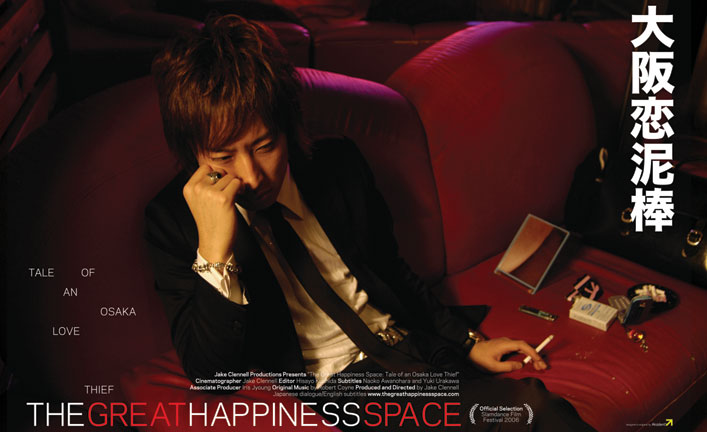
Finally putting an end to the unplanned Monday’s movie marathon, thanks to this award-winning documentary produced in 2006. At first I assumed the Great Happiness Space would be delightful and colorful (given its title and the cover page) but not quite expected to go so deep as to uncovering the psychological malaise among the Japanese youth.
Counter to my predication, it is NOT a (syndicate) tale of Japanese gigolo/entertainer wealthy women in Japan, rather it is a reality-cum-documentary film recording the real lives and interviews of the male employers (hosts) and the male customers working in the second largest city in Japan: Osaka. Incidentally, the entertainment spot is located in Minami, where I had visited in winter 2008 with my then-fiance. Had I been more responsible for planning my travels, I would have been more informed of the cultural role and impact of these places that I was lucky enough to leave footprints.
Back to the film, if you think that this business is just a harmless form of entertainment, where young, good-looking men are paid to fondle with the spendthrift women, or even a triumph of feminist rights of some sort, you couldn’t have been more wrong. It turns out that most female customers gave away their normal lives to work as cabaret girls, call girls, and even prostitutes (fuzoku) in order to afford the exorbitant costs in these host clubs. In exchange, the male hosts praise these girls, drink with them, and make them feel important and “loved”. Having understood the female psyche to indulge in self-deceitful dreams, the male hosts confessed “we sell dreams, that’s our job.” It really saddens me when one of the female client related, “I am not buying guys, I’m buying times.” As if there are no better ways to burn their energies; as if the only way to acquire a positive self-image is through telling lies and engaging in a mutually hurtful act of fooling around where both parties feel guilty and shameful of what they did in order to make money and make themselves “happy”.
The system needs a break. But the revolutionary forces will not come from within. Here the male workers seem to get it “people are not always strong, esp. when they are alone.” This is where a communal action comes into play. Through education, persistent resistance to evil temptations, consciousness-raising, and genuine sharing and respect, we can fight off these immoral and malicious money-sucking businesses. We need to be strong, not for some transcendental mighty goals, but simply for getting what we want. Is money what people really want? Or is it a means to the more primitive human needs? Money in the form of printed paper can never be the ultimate goal for what we are fighting for. Money can only be meaningful in stratifying and stimulating social relationship. A bucket of gold loses its luster if you lost track of what you really want in your life. This is why the idolized and highly paid male host wants a trustable girlfriend after all. And he realized what he lost is way more expensive than what these girls pay him: the ability to trust, and love other human beings.
We need more people to respectfully heal these damaged souls, we need to rescue them (not through a man-made sculpture and a text of gospel) but to help them gain perspectives, to realize that there is alternatives, that meaningful human interaction is within the realm of reason and hope, that history is replete of strong, solitary peoples enduring hardship and loneliness for something much more desirable and authentic. All in all, people (esp. girls) need to understand that nobody can take control of your own life unless you allow them to.
I highly recommend this movie to anyone who is interested in understanding Japanese subcultures.
No comments:
Post a Comment